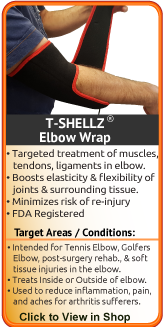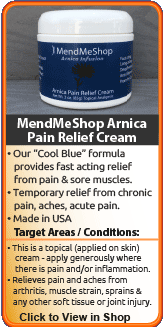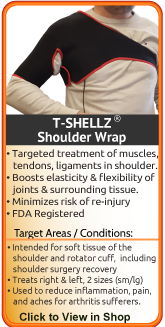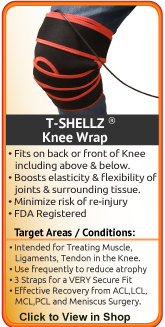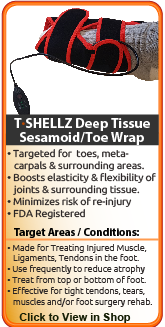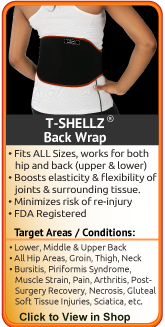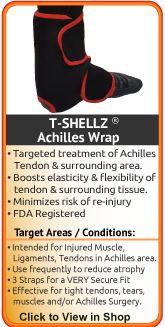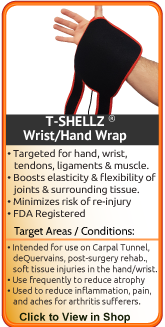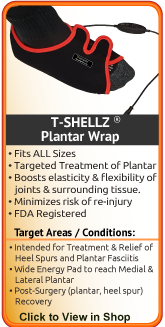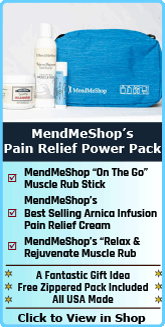Muscle Cramp vs Muscle Spasm:
What's the Difference?
Spasming Muscles
Muscle spasms are short term contractions that can appear in any muscle in the body and cause extreme pain or, in some cases, no pain at all.
Your own body has a built-in protection system and will use a muscle spasm as a way to shield itself after an injury or disease. This system works in two ways, (1) restricting movement of the injury site (basically acting like a protective splint to freeze up the joint) and (2) guarding against pain. Take a herniated disk - muscles in the back will spasm to help prevent 'more' pain from happening. In cases where there is damage to a muscle (often resulting from a large tear, complete rupture or broken bone), the muscle spasms may be very strong and you will be unable to move the area of your injury.
Irritated or pinched nerves can trigger muscle spasms as well. For instance, a facial spasm may occur when a blood vessel is pressing against a facial nerve - such a condition is called hemifacial spasm. In my personal case, I have a pinched nerve in my neck from an old trampoline injury - my left upper back and shoulder muscles tense up and harden (spasm) when it flares up. The term spasm is also unfortunately used when describing twitches, tics or jerks although they are not spasms at all.
Cramping Muscles
Muscle cramps are painful muscle spasms.
Your blood is the transport mechanism for everything that's good inside you. It carries oxygen, nutrients, water and antibodies. This basic movement of blood into your muscles is also responsible for the chemical interaction for your muscles to move.
When we exercise, our blood vessels widen, our heart rate increases and the blood moves faster thru our veins. After we stop exercising our blood slows and toxins build up in the blood vessels. This build up of toxins reduces the signal to the muscles to relax and we end up with a painful muscle cramp.
The greater the change in intensity of your work out, the greater the chance you have of developing a muscle cramp. Leg cramps (also known as a charley horse) are the most common type of muscle spasm; for people in good physical condition the leg spasms normally only last for a brief few moments.
Many areas of the body can have muscle cramps as they are common in the feet, hands, arms, and legs. Chronic neck and back pain sometime result from frequent muscles spasms in the large muscle groups of the neck (trapezius muscle), and the rib cage/mid-back (latissimus dorsi muscle), and lower back. When they happen in the middle of the night waking you up from sleep, these are called nocturnal cramps. Cases of nighttime leg cramps are common and this condition is also termed as restless leg syndrome. Up to 60 percent of adults report that they have had nocturnal leg cramps. (source: American Family Physician)
If the cramping is happening often to the same muscle, the tissue around the cramp location may have been strained or damaged. The body's natural response for repairing damaged soft tissue (muscles,tendons,ligaments) is to heal it the quickest way by growing scar tissue and adhesions to bind torn tissue together. Unfortunately, scar tissue is not elastic and will usually result in a loss of ROM (range of motion). Scar tissue may plague you for weeks, months and maybe even years, depending on your level of activity.
If you suffer from on going muscle spasms that cause daily stiffness and tightness to your muscles it could be representative of a more serious problem so you should see a physician. As mentioned the build-up of scar tissue may also be a secondary cause for more pain. The growth of scar tissue and adhesions can be significant and very debilitating. Ultimately scar tissue will causes stiffening in the muscles, entrapping nerves (painful!), restricting movement, reducing elasticity of soft tissue and blood circulation.
Causes of Muscle Spasm
Muscle spasms occur when there is tightening of the muscle and/or muscle stiffness and can be caused by a multitude of factors. The more common causes (and most benign) of muscle spasm are injury to the muscle (or surrounding soft tissue) and muscle overuse/fatigue, menstruation or pregnancy. However, muscle spasms can also be triggered by alcoholism, poor circulation in the legs, cardiovascular disease , arthritic changes in the spine, spinal cord injury, hormone issues, underactive thyroid (Hypothyroidism), low red blood cell count (diabetes, anemia), nerve dysfunction, kidney failure or low levels of minerals (potassium or calcium) in the body. A large number medications have side effects which increase the risk of muscle spasm. Amyotrophic lateral sclerosis, multiple sclerosis and other diseases of the nervous system show elevated risk for muscle spasm as well.
Speak to your doctor if you are having frequent muscle spasms. It may be a sign of a medical problem that requires treatment.
Muscle Cramp Signs & Symptoms
The signs and symptoms of a muscle cramp are the quick onset of sharp to intense pain as the muscle contracts and you may feel a bulging muscle in the area of the cramp. The pain many last for a few seconds to a several minutes. If the cramp has been long lasting and quite painful, the muscle may be sore and tender for a few days.
Treatment: Stretching & Conservative Treatments for Muscle Cramps
Most muscles cramps are very short lived and can easily be relieved with a few simple remedies. First, when the muscle cramp happens stop your activity and try gentle stretching and massaging the muscle.
Stretching

- Leg cramps;
Hamstring muscle cramp (back of your thigh), gently up a small amount of your weight on the leg with the cramp and bending your knee slightly, or sit or lie down with you leg out straight and pull the top of the foot toward your head.
Quadricep muscle cramp (front of the thigh) hold onto a chair to steady yourself and pull your foot back toward your buttock.
Calf muscle cramp, lean forward against a wall with one leg in front of the other. Straighten your back leg and press your heel into the floor. (Your front knee is bent). - Hand cramps; opening and closing your hands either by themselves or with some sort of resistance device like a grip strengthener or stress ball.
- Arm cramps;
Triceps stretch (Back of your arm). Bring one of your elbows across your body, towards the opposite shoulder. Use your other hand to bring your elbow closer to your shoulder. Hold for 10 to 20 seconds, then switch sides. Alternate method: raise your arm over your head and bend your elbow all the way so your hand is behind your neck. Use your other arm to stabilize your elbow. Hold for 10-20 seconds, then switch sides. You should feel either of these stretches in the back of your arm.
Bicep stretch (front of your upper arm), lift both arms out to your side at shoulder height, keeping shoulders even with each other. Rotate your hands/wrists so they are facing behind you. - Shoulder/Upper back cramps; Trapezius muscle stretch, do super shoulder shrugs, pulling your shoulders all the way to your ears, hold for a few seconds and let them fall to a relaxed position. Rolling your shoulders in both directions. Side to side stretch, sitting up straight, with your feet flat and shoulders back, grab onto the bottom of your chair with your right hand. Then slowly tilt your head sideways, bringing your left ear toward your left shoulder until you feel a gentle stretch along the right side of your neck and shoulder. Hold for 10 to 15 seconds; repeat on the opposite side.
The Application of Heat for Muscle Cramp Prevention
The application of heat results in a dramatic increase in blood flow to soft tissue (muscles, tendons) located deeper within the body - all in a non-invasive manner. The body has a natural temperature regulatory system - when there is localized heat, the body pumps more blood to the area in an attempt to bring down the temperature. This natural system is what we can use to increase blood flow to cramped or spasming muscles.
What is needed, is a way to generate consistent heat in a specific location - the optimal way we believe to do this is through the TShellz Wrap®. The TShellz Wrap® generates a consistent amount of heat evenly across the whole area of the Energy Pad. The body responds to this deep heat by increasing blood flow in the area, and this is exactly what your cramped mucle needs - more blood flow and heat.
Why do cramped/injured muscles need heat? It is well known that heat will help connective tissue in the area elongate, and stay elongated for a while. The increased lengthening and flexibility of muscles and tendons mean that the TShellz Wrap® is an essential tool to use before stretching as the increased blood flow, improved elasticity and Range of Motion in your muscle will help maintain good muscle health during stretches while reducing the risk of reinjury throughout your recovery.
Stay Hydrated
Proper hydration is a seemingly simple concept that is often overlooked - underhydration is notorius for muscle cramping yet is probably the easiest to solve. Drinking water or other healthy drinks throughout the normal course of a day or when working will make the muscles less likely to cramp. Good nutrition is also quite important as low levels of potassium, calcium and sodium make muscles more likely to spasm. A good simple idea to follow would be to eat a banana an hour prior to working out as bananas are are rich in electrolytes and minerals that muscles and other soft tissue require.
If you want to get back to your daily activities with fast, effective, and safe home treatments, speak to your doctor or therapist about incorporating the TShellz Wrap® into your training, recovery, and every day maintenance.
Our online shop accepts Visa & Mastercard as well as a Paypal Payment option.
We also encourage your to Call Our Office at 1-866-237-9608 (toll free continental NA) where we can answer any questions you have and/or take your order via phone.
CLICK HERE TO BROWSE OUR SHOP AND CHECK PRICES
Living with pain is never easy and we encourage you to call us with any questions you have related to your hamstring injury. We will do our best to help.
Available Monday to Friday
FREE SHIPPING ON ALL PRODUCTS CURRENTLY ENABLED
Product specialists are available 9:00 am to 5:00 pm Eastern Standard Time Monday to Friday.
If any question or concern arises, call us or simply send us an email at any time (we check our emails constantly all throughout the day and night.. even on holidays!). We will respond as soon as possible.
North America Toll Free 1-866-237-9608
Outside North America +1-705-532-1671
Please be aware that this information is neither intended nor implied to be a substitute for professional medical advice. All testimonials and comments reflect the real life experiences of individuals that used our products, however, individual results may vary. Always seek the advice of your physician or other qualified health provider before using any of our outstanding products to make sure they are right for you and your condition or if you have any questions regarding a medical condition.
For more information, call us via: 1-866-237-9608 or send us an email. View our Privacy Policy.
The terms Inferno Wrap®, Freezie Wrap®, T-Shellz® and Mendmeshop.com® are registered trademarks of In.Genu Design Group Inc.
All images shown are exclusive Copyright© 2006 - 2025 AidMyMuscle.com.
